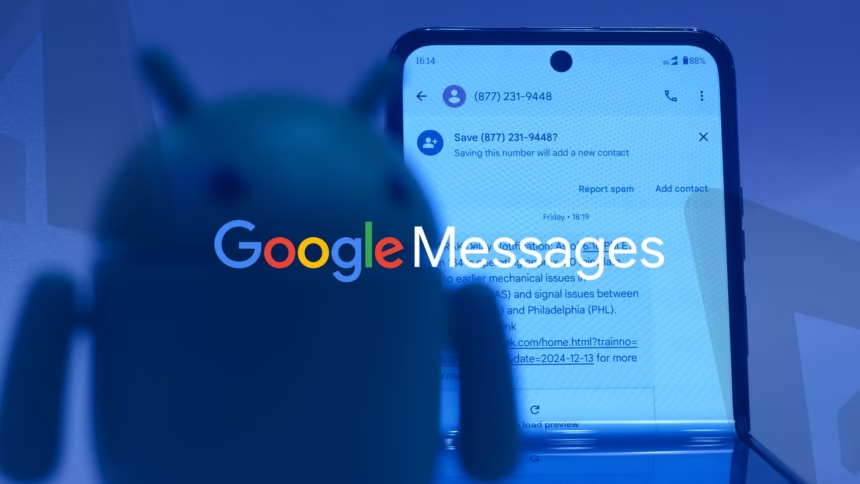SAN FRANCISCO – Google has started rolling out @mentions in its Messages app on Android and iOS, and reactions are already split. People who live in group chats are excited, while those tired of constant alerts are bracing for impact.
The feature, common in tools like Slack and Microsoft Teams, now comes to everyday texting and gives users a way to call out a person directly in busy group threads. Google confirmed the launch in a support update on 12 November, following a beta test that began last month, and the feature is now arriving on millions of phones worldwide.
At a basic level, @mentions in Google Messages work much like they do on social platforms. In a group chat, you type the “@” symbol, and a list of people in the conversation pops up. Choose a name, and the app inserts a bold tag such as @John, @Sarah, or @Mum in your message.
The person you mention gets a separate notification, even if they have muted that group chat, so they are far less likely to miss it. For the sender, it feels like a tap on the shoulder. For the recipient, it can be a lifeline when the chat is full of overlapping plans, work chatter, or sports banter.
“Group chats have become the modern dinner table,” said Priya Patel, product manager for Messages at Google, in an interview with The Chronicle. “Important details can vanish in seconds. @Mentions gives you a direct route to someone inside the group, without forcing people to move to a private chat.”

The feature arrives as part of Google’s broader effort to turn Messages into a central hub for everyday communication. With more than 1.5 billion people using RCS (Rich Communication Services), Google’s upgraded standard for messaging, the app has grown far beyond basic SMS.
Features such as end-to-end encryption, better photo and video quality, and read receipts have narrowed the gap with Apple’s iMessage in the U.S. market. Analysts see @mentions as another move in that long-running rivalry.
“It’s a smart addition,” said tech analyst Carla Reyes of Forrester Research. “Apple’s iMessage already supports inline replies and mentions, but Google is pushing hard on the fact that Messages works across platforms. This feature still functions in mixed groups where some people use iPhones over SMS and others use Android on RCS.”
Some early users have already worked @mentions into their daily routines. In a 12-person parenting group in Chicago, member Lisa Chen told The Chronicle that the feature made planning a school fundraiser far less stressful. “The chat was impossible. Dozens of messages, all mixed up. Now I just @ the treasurer when it is about money, and she knows it is for her. I no longer scroll back through pages of chatter about cake recipes.”
Others are much less impressed. Critics argue that @mentions will fuel notification overload rather than fix it. On X (formerly Twitter), the tag #MuteMentions briefly trended after the first wave of the rollout. One widely shared post said: “Google just gave my group chat a megaphone. Thanks, I hate it.” Privacy groups are also uneasy.
Unlike WhatsApp, which has stricter rules around tagging, Google Messages lets any member of a group @mention any other member. In mixed iOS and Android groups where RCS is not fully active, this might expose phone numbers more clearly than some people expect.
Google has tried to address some of these worries in an updated privacy notice, stating that @mentions are handled locally on the device and do not reveal extra personal data. Even so, the Electronic Frontier Foundation (EFF) has urged caution.
In a statement, the group said: “Features that single out people inside group chats can put pressure on them to respond. There should be clearer and easier ways to opt out.”
From a technical point of view, the feature is quite polished. In RCS group chats, @mentions appear with a coloured underline and a small “jump to” control for the person who has been tagged, so they can skip back to that message. In chats that fall back to SMS, the mention shows as plain text, such as @John, but it still triggers a higher-priority notification for that user.
Google says it is working with mobile networks to increase RCS support, which it estimates at roughly 70% in the U.S., though uptake remains slower in regions such as Latin America.
Rival companies are paying attention, even if they are not rushing to copy the idea. Meta, the owner of WhatsApp, says it has no current plans to add @mentions in the same way for its 2 billion users, arguing that it wants to keep the interface as simple as possible. Apple declined to comment on whether it might refine or extend its own mention feature inside iMessage in response to Google’s move.
For Google, Messages is about far more than texting. The app is a key entry point into its wider services. Tests are already underway to hook in Gemini, Google’s AI assistant. In the future, users may be able to type something like @Gemini in a group chat and ask for a summary of a holiday itinerary or a list of agreed-upon tasks. “We are working toward more contextual intelligence,” Patel said, hinting at deeper AI features without giving a clear release date.
Right now, @mentions are switched on by default in the latest Messages build (version 20251112_01). You can turn the feature off, but the option sits quite low down in Settings, under Advanced, then @mentions. Some users and digital rights groups have criticised this hidden placement and want a clearer prompt in the app. Google says it will refine the controls in upcoming updates.
In a time when every ping competes for your attention, @mentions in Google Messages act as both a courtesy and a demand. They make group chats easier to follow, yet they also make it harder to ignore people who call you out by name. The next time your phone lights up with an “@You” alert, you will know exactly who wants you, and it may be harder than ever to look away.
Google Messages @mentions
Google Messages, the standard SMS and RCS app on most Android phones, is now testing a long-awaited @mentions feature for group chats. Inspired by popular messaging platforms like WhatsApp, Telegram, and iMessage, this update lets you tag people so you can get their attention without pinging everyone at once. It is currently rolling out in beta and only works in RCS group chats. Every person in the group needs RCS turned on for @mentions to function, so it will not appear in traditional SMS or MMS conversations.
How It Works
-
- Tagging someone: In a group chat, type the
@symbol in the message field. A list of group members appears, so you can pick the person you want. - Choosing and editing: Tap a name in the list to insert the tag. You can change how the name looks in the message, such as turning “John Doe” into “John”, and the tag still works in the background.
- Notifications: The person you mention gets a special notification even if they have muted that group chat. In the chat list, you may see anAn
@An icon next to conversations where you have been tagged. - Example: If you type
@John This is important!John receives a targeted alert, and your message appears highlighted for him.
- Tagging someone: In a group chat, type the
This feature makes busy group chats easier to manage, since you can direct questions and updates to the right people instead of sending follow-up private messages.
Availability and Rollout
-
-
- Beta testing: First spotted in app teardowns back in May 2025, @mentions are now showing up for some users in Google Messages beta version 20251103_00_RC00, as of mid-November 2025. Testers have reported the feature on devices such as the Pixel 10 and selected Samsung phones running beta software.
- Stable release: Google has not given a firm date for the full launch, but the current beta rollout suggests a wider release in the near future, likely within the next few weeks or months. It is not yet visible for everyone. To try it early, you may need to join the Google Messages beta through the Play Store.
- Requirements: RCS must be active in your app. You can check this in Messages settings under Chat features. For @mentions to work properly, every member of the group needs RCS enabled.
-
Why It Matters
Large group chats can quickly become overwhelming. @Mentions tackle a long-standing annoyance by letting people direct messages to the right person without spamming the full group. It moves Google Messages closer to the feature set of other modern messaging apps while keeping the interface familiar.
Some users are worried that the feature could add to notification fatigue if people overuse it, especially in big social or work groups. If you do not see @mentions yet, keep your app updated or consider joining the beta. For more details and real user feedback, you can check the official Google Messages help pages or visit communities like r/GoogleMessages on Reddit.
















